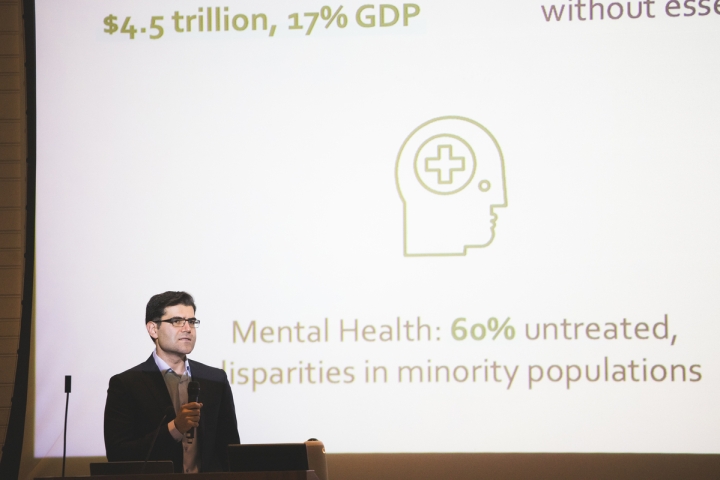Artificial intelligence presents a huge opportunity to tackle complex health care challenges, but there are also great risks, Center for Precision Health and Artificial Intelligence Director Saaed Hassanpour said as he set the stage for the inaugural symposium of the newly launched center.
The one-day AI in Medicine: Bridging Innovation & Practice event, held at the Hanover Inn, highlighted AI-driven innovations that are already changing the landscape of health care and sparked thoughtful discussions on recognizing potential pitfalls that the technology presents.
Building on its well-known legacy in AI—the term artificial intelligence was first coined here—and a rich history of innovation in health care—the first diagnostic medical imaging in the U.S. was performed here—Dartmouth is uniquely positioned to play a significant role at the intersection of these two disciplines, said Hassanpour, professor of biomedical data science, epidemiology, and computer science.
His sentiments were echoed by President Sian Leah Beilock, who delivered opening remarks to kick off the symposium.
“I know this is a fast-growing field and it requires people coming together from different fields to work together,” Beilock said. “Our size and scale allows us to do something that’s really special, which is talk across disciplines, and that’s really where I see the crux of what Dartmouth has to contribute.”
She called attention to several research efforts already underway at Dartmouth, from the development of AI tools to help diagnose colorectal cancer and identify novel biomarkers for breast cancer to using AI to create more effective mental health technologies.

The talks and panel discussions that followed showcased the power of using AI to unlock valuable insights from vast stores of digital health data, paving the way for more efficient and personalized care while raising important and complex questions about security, privacy, biases, ethics, and equity.
The morning’s keynote talk by Curtis Langlotz, professor of radiology, medicine, and biomedical data science at Stanford University, was a deep dive into how AI is transforming medical imaging, specifically radiology, which is particularly suited to harness the tremendous ability of today’s neural networks at processing images.
AI algorithms can assist radiologists at every step of the imaging process, said Langlotz. There are aids that can provide inputs to help decide which imaging tests to order; programs to enhance image quality, making it possible to reduce radiation doses used in imaging; tools that instantaneously detect imaging problems to ensure that faulty images are retaken right away; applications that conduct basic triage to identify cases that may need immediate attention; and virtual assistants that help with reporting observations and following up with patients.
Langlotz also reviewed key limitations of machine learning models, which reflect the biases of their data and can become less reliable when, for instance, they are coupled with new imaging equipment.
Responding to questions about navigating these shortcomings, Langlotz said that educators and researchers must ensure that medical students are armed with an understanding of how AI models work, build smaller, more focused models that are trained and tailored for medical applications, and go the extra mile to validate models for accuracy and reliability.
What’s more, it is important to think about “who’s in the room to decide what problem is being solved and make sure that the solution we have is fair,” Langlotz said.
In the panel discussion that followed, Dartmouth Health clinicians—radiologist Jessica Sin, neurosurgeon Jennifer Hong, pathologist Louis Vaickus, and physician Timothy Burdick ’89, MED ’02—discussed the ways in which AI is already integrated into their day-to-day patient care practices.
In their talks and the Q&A that followed, the panelists were optimistic about the positive impacts of AI tools in improving the accuracy, efficiency, and accessibility of healthcare delivery.
They were also quick to acknowledge that it is crucial to be thoughtful and responsible in how the tools are integrated into the decision-making process while maintaining transparent communication and engaging in open conversations with patients.
“There is a bias to go along with what our technology tells us to do, but in health care the stakes are high,” said Sin. It behooves providers to carefully review decisions made with the aid of technology and educate themselves on how to use the tools safely and responsibly.
“There are risks of implementing AI, but there is also a really big risk in not implementing it,” said Burdick. These technologies can shrink wait times for care, enabling timely and crucial interventions amid high patient volumes, he said.
New technology can also expand health care access to underserved populations if health equity is prioritized as these tools are rolled out, Burdick said. “The future is here; it’s just not evenly distributed.”
The afternoon sessions turned the spotlight on how Dartmouth researchers across disciplines are exploring new ideas and creating novel technologies and its commitment and leadership in fostering responsible innovation as a member of the international AI Alliance.
Keynote speaker Faisal Mahmood, associate professor of pathology at Harvard University, shared his expertise on how AI is revolutionizing image analysis in pathology.
Neuroscience graduate student Mizuki Tojo participated in the symposium to learn from perspectives of medical professionals using AI in clinical settings. “The applications of AI in health are only growing, so I think it’s important that I at least have an understanding of how it could be implemented, even if I’m not the one implementing it,” she said.
Tojo was also eager to hear how experts shared their research with a broad audience. “When we’re trying to bring together two different fields like health and AI, we have to communicate ideas across disciplines and that can be difficult,” she said. “Attending conferences like this is an obvious way to expose myself to how this can be done effectively.”
The talks and discussions at the event underscored the incredible potential of artificial intelligence in medicine, Hassanpour said in his concluding remarks. “If AI technologies and innovations are developed rigorously and used responsibly, they have great potential to benefit all of us, especially under-resourced and disadvantaged populations.”

